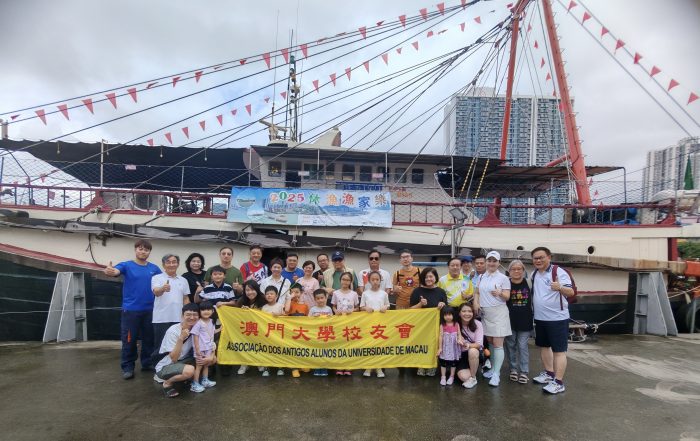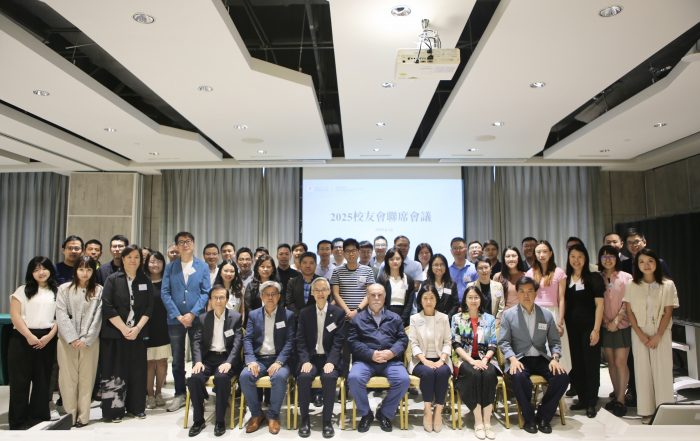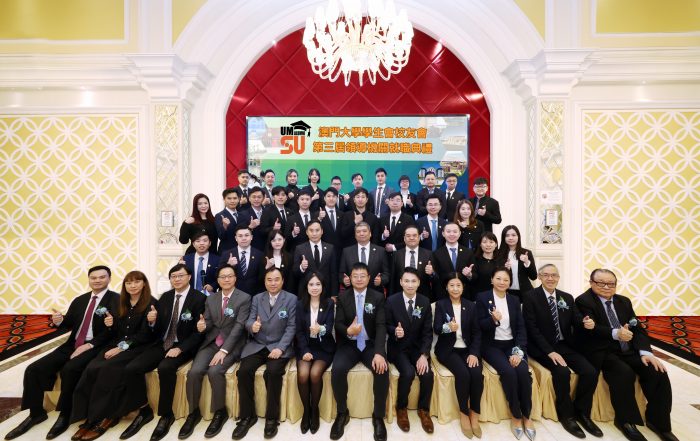The office of Davis Fong, director of the Institute for the Study of Commercial Gaming and professor in the Faculty of Business Administration at the University of Macau (UM), is clean and spotless, with a view of the university’s picturesque lake. At times, when Prof Fong has worked at his desk for too long, he likes to stand at the window to enjoy the lake view. ‘When I joined the university, UM was still located on the old campus. Because of a shortage of classrooms, some classes had to be taught in makeshift rooms created with shipping containers,’ says Prof Fong. ‘The environment and facilities are much better on the current campus than those on the old campus.’
Witnessing UM’s Important Transition
‘When I applied to UM, there were two names for the university. One was the University of East Asia and the other was the University of Macau,’ says Prof Fong. ‘It was a transitional period in the university’s history and was quite special.’ In 1990, Prof Fong began his undergraduate studies in the Faculty of Business Administration at the private University of East Asia, UM’s predecessor (the university was acquired by the government in 1988 and renamed the University of Macau in 1991). In the same year, undergraduate programmes at the university changed from a three-year system to a four-year system and the University College was restructured. He was one of the students and faculty members who witnessed this important turning point in the university’s history.
The renaming of the University of East Asia was not only a change of name, but also signified the beginning of rapid growth in the number of students and faculty members at the university, thanks to the support of the government. ‘There was a huge increase in the number of students. Because of the lack of classrooms, we took some of the classes in makeshift classrooms made of shipping containers while new teaching buildings were being built,’ says Prof Fong. ‘It was the most special experience in my college life.’
A Chance to Begin Gaming Research
When asked how he began a career in gaming research, Prof Fong smiles and says: ‘It was all by chance!’
After graduating from the university in 1994, Prof Fong stayed on as a teaching assistant while pursuing a master’s degree in business administration. In 1998, when the Macao Foundation collaborated with mainland universities to recruit PhD students in Macao for the first time, he decided to apply to a PhD programme in economics offered by Tsinghua University’s School of Economics and Management. In 1999, the year Macao returned to the motherland, Prof Fong, already a lecturer at UM, became one of the first PhD students from Macao to be admitted to Tsinghua University, which signified the beginning of his career in gaming research.
‘At that time, UM encouraged its lecturers to pursue PhD studies to improve its quality of teaching and research. I personally also wanted to pursue further studies in order to make a greater contribution to the field,’ says Prof Fong. ‘While I was working on my thesis topic, my supervisor asked me what I wanted to study and what I thought was the most important topic to study about Macao. At that time, I thought that Macao’s economy was dominated by the gaming industry, so I decided to study gaming. When I tentatively selected the title of my PhD thesis, ‘A Study on the Social and Economic Impact of Gaming on Macau’, I had no way of knowing that Macao would open up its gaming market in three years’ time.’
In 2002, Macao opened up its gaming industry. In 2003, UM established the Institute for the Study of Commercial Gaming (ISCG), the first institute in Macao to conduct gaming research. Prof Fong started off as a researcher in the institute before being appointed as its director, leading the institute in providing policy-related advice and training courses, as well as promoting responsible gambling in collaboration with government departments and social organisations.
‘In the early days after Macao’s handover, no one thought of doing research on gaming. Neither the government nor the higher education institutions had any data on gaming,’ says Prof Fong. ‘However, with our efforts over the years, and thanks to government’s confidence and support, the ISCG has collected a lot of data and has conducted various studies, which provide the basis for government policy-making.’ As an expert in gaming research, Prof Fong has completed nearly 50 research projects for various government departments in Macao.
Nurturing Outstanding Management Professionals for Macao
As the only comprehensive public university in Macao, UM saw the need for gaming education and launched the Bachelor of Science in Hospitality and Gaming Management (now known as the Bachelor of Science in International Integrated Resort Management) in 2003 to nurture outstanding management professionals for the local community. Over the years, Prof Fong and his colleagues have trained many outstanding students who have gone on to become the pillars of Macao’s gaming and hospitality industry.
To help the SAR government enhance the competitiveness of Macao residents, the institute also offers a Diploma in Casino Management programme and an Advanced Diploma in Gaming Management programme to provide training opportunities for gaming industry employees and those who are interested in joining the industry. Through these training opportunities, the institute aims to professionalise gaming management and boost the competitiveness of the industry’s human resources.
Gaming Study Informs Policy Making
As a research institute, the ISCG actively fulfills its research function. ‘In 2003, the institute conducted its first study on gaming – a survey on Macao residents’ participation in gaming activities. I remember that I personally submitted the first report to Edmund Ho, the first chief executive of Macao SAR, to draw the attention of the Macao government to the study,’ says Prof Fong. ‘Since then, the survey has been conducted every three years to monitor gambling behaviour in Macao. Data collected through the surveys have provided the basis for government policy-making.’ In addition, commissioned by the government, Prof Fong and his team also began a study on responsible gambling policy in 2007.
Currently, Prof Fong and his team are working with various faculties at UM to conduct interdisciplinary research on the mechanisms of gaming addiction, addiction prevention, as well as the neuroscience of gaming and decision-making. Prof Fong says that the study could help uncover the neural mechanisms of addiction and explore possible intervention and treatment methods.
Passing on the Right Attitude to the Next Generation
As Prof Fong advanced in his career from an assistant professor to a full professor, he witnessed the university’s rapid growth and diligently fulfilled the responsibilities inherent in his role. Besides imparting professional knowledge, he also tries to pass on his attitude towards work and life to his students. ‘Some knowledge and theories may become obsolete after a certain period of time, but teaching students the right attitude towards life, learning, and the pursuit of one’s life goals will have a lifelong impact on them,’ says Prof Fong.













